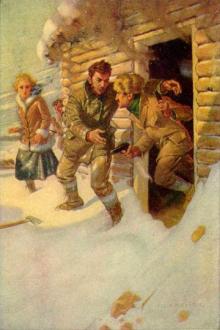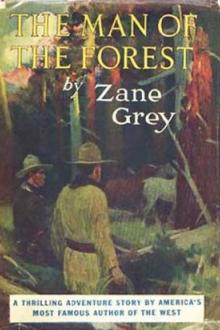Astoria; Or, Anecdotes of an Enterprise Beyond the Rocky Mountains by Irving (top romance novels .TXT) 📗

- Author: Irving
Book online «Astoria; Or, Anecdotes of an Enterprise Beyond the Rocky Mountains by Irving (top romance novels .TXT) 📗». Author Irving
The several parties we have mentioned all set off in company on the 29th of June, under a salute of cannon from the fort. They were to keep together for mutual protection through the piratical passes of the river, and to separate, on their different destinations, at the forks of the Columbia. Their number, collectively, was nearly sixty, consisting of partners and clerks, Canadian voyageurs, Sandwich Islanders, and American hunters; and they embarked in two barges and ten canoes.
They had scarcely got under way, when John Day, the Kentucky hunter, became restless and uneasy, and extremely wayward in his deportment. This caused surprise, for in general he was remarkable for his cheerful, manly deportment. It was supposed that the recollection of past sufferings might harass his mind in undertaking to retrace the scenes where they had been experienced. As the expedition advanced, however, his agitation increased. He began to talk wildly and incoherently, and to show manifest symptoms of derangement.
Mr. Crooks now informed his companions that in his desolate wanderings through the Snake River country during the preceding winter, in which he had been accompanied by John Day, the poor fellow’s wits had been partially unsettled by the sufferings and horrors through which they had passed, and he doubted whether they had ever been restored to perfect sanity. It was still hoped that this agitation of spirits might pass away as they proceeded; but, on the contrary, it grew more and more violent. His comrades endeavored to divert his mind and to draw him into rational conversation, but he only became the more exasperated, uttering wild and incoherent ravings. The sight of any of the natives put him in an absolute fury, and he would heap on them the most opprobrious epithets; recollecting, no doubt, what he had suffered from Indian robbers.
On the evening of the 2d of July he became absolutely frantic, and attempted to destroy himself. Being disarmed, he sank into quietude, and professed the greatest remorse for the crime he had meditated. He then pretended to sleep, and having thus lulled suspicion, suddenly sprang up, just before daylight, seized a pair of loaded pistols, and endeavored to blow out his brains. In his hurry he fired too high, and the balls passed over his head. He was instantly secured and placed under a guard in one of the boats. How to dispose of him was now the question, as it was impossible to keep him with the expedition. Fortunately Mr. Stuart met with some Indians accustomed to trade with Astoria. These undertook to conduct John Day back to the factory, and deliver him there in safety. It was with the utmost concern that his comrades saw the poor fellow depart; for, independent of his invaluable services as a first-rate hunter, his frank and loyal qualities had made him a universal favorite. It may be as well to add that the Indians executed their task faithfully, and landed John Day among his friends at Astoria; but his constitution was completely broken by the hardships he had undergone, and he died within a year.
On the evening of the 6th of July the party arrived at the piratical pass of the river, and encamped at the foot of the first rapid. The next day, before the commencement of the portage, the greatest precautions were taken to guard against lurking treachery, or open attack. The weapons of every man were put in order, and his cartridge-box replenished. Each one wore a kind of surcoat made of the skin of the elk, reaching from his neck to his knees, and answering the purpose of a shirt of mail, for it was arrow proof, and could even resist a musket ball at the distance of ninety yards. Thus armed and equipped, they posted their forces in military style. Five of the officers took their stations at each end of the portage, which was between three and four miles in length; a number of men mounted guard at short distances along the heights immediately overlooking the river, while the residue, thus protected from surprise, employed themselves below in dragging up the barges and canoes, and carrying up the goods along the narrow margin of the rapids. With these precautions they all passed unmolested. The only accident that happened was the upsetting of one of the canoes, by which some of the goods sunk, and others floated down the stream. The alertness and rapacity of the hordes which infest these rapids, were immediately apparent. They pounced upon the floating merchandise with the keenness of regular wreckers. A bale of goods which landed upon one of the islands was immediately ripped open, one half of its contents divided among the captors, and the other half secreted in a lonely hut in a deep ravine. Mr. Robert Stuart, however, set out in a canoe with five men and an interpreter, ferreted out the wreckers in their retreat, and succeeded in wrestling from them their booty.
Similar precautions to those already mentioned, and to a still greater extent, were observed in passing the Long Narrows, and the falls, where they would be exposed to the depredations of the chivalry of Wish-ram, and its freebooting neighborhood. In fact, they had scarcely set their first watch one night, when an alarm of “Indians!” was given. “To arms” was the cry, and every man was at his post in an instant. The alarm was explained; a war party of Shoshonies had surprised a canoe of the natives just below the encampment, had murdered four men and two women, and it was apprehended they would attack the camp. The boats and canoes were immediately hauled up, a breastwork was made of them and the packages, forming three sides of a square, with the river in the rear, and thus the party remained fortified throughout the night.
The dawn, however, dispelled the alarm; the portage was conducted in peace; the vagabond warriors of the vicinity hovered about them while at work, but were kept at a wary distance. They regarded the loads of merchandise with wistful eyes, but seeing the “long-beards” so formidable in number, and so well prepared for action, they made no attempt either by open force or sly pilfering to collect their usual toll, but maintained a peaceful demeanor, and were afterwards rewarded for their good conduct with presents of tobacco.
Fifteen days were consumed in ascending from the foot of the first rapid to the head of the falls, a distance of about eighty miles, but full of all kinds of obstructions. Having happily accomplished these difficult portages, the party, on the 19th of July, arrived at a smoother part of the river, and pursued their way up the stream with greater speed and facility.
They were now in the neighborhood where Mr. Crooks and John Day had been so perfidiously robbed and stripped a few months previously, when confiding in the proffered hospitality of a ruffian band. On landing at night, therefore, a vigilant guard was maintained about the camp. On the following morning a number of Indians made their appearance, and came prowling round the party while at breakfast. To his great delight, Mr. Crooks recognized among them two of the miscreants by whom he had been robbed. They were instantly seized, bound hand and foot, and thrown into





Comments (0)